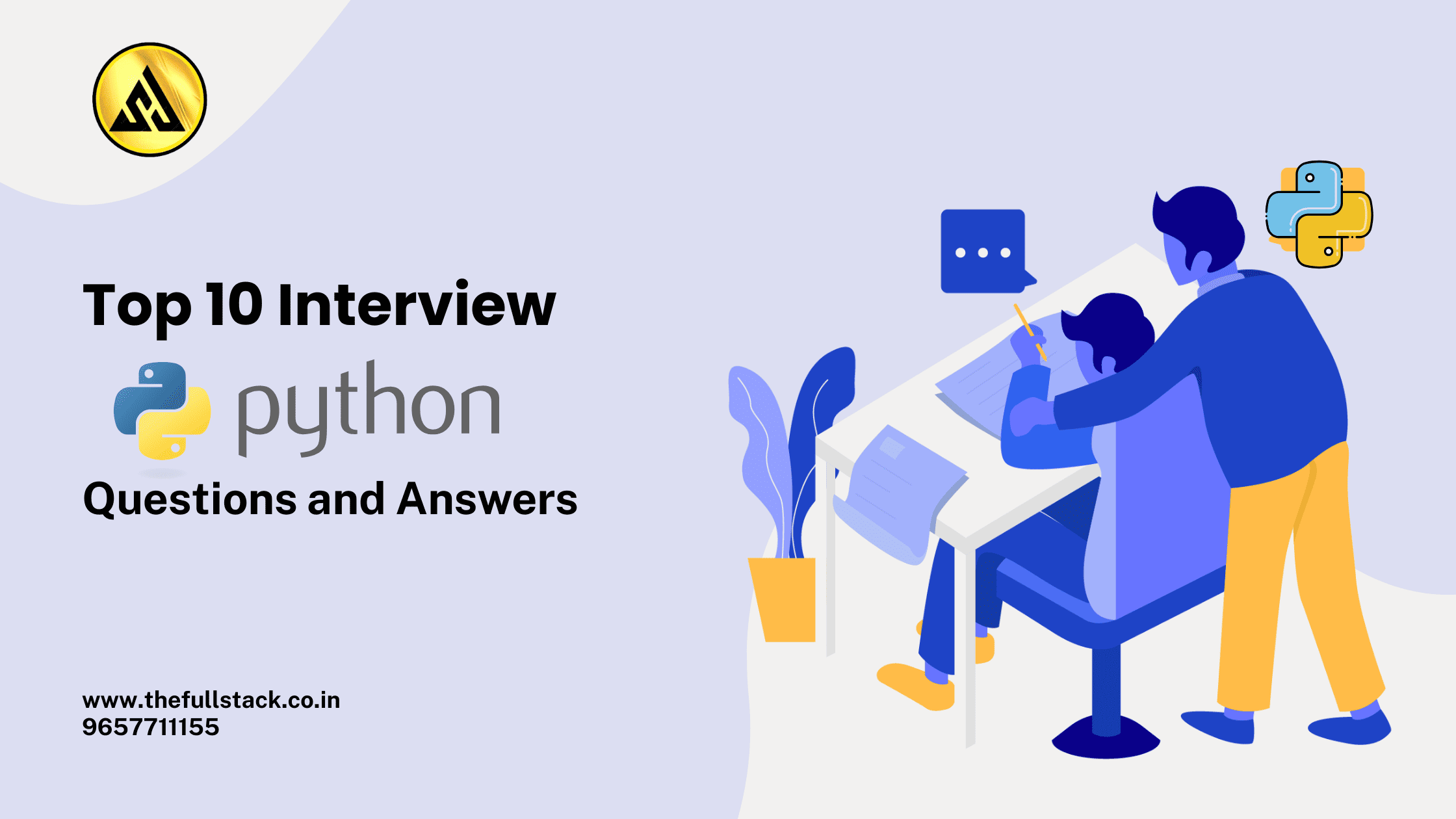
Top 10 Python Interview Questions and Answers (2025 Guide)
Python is one of the most in-demand abilities nowadays, regardless of whether you’re a novice or an experienced developer getting ready for your next big chance. The top ten Python interview questions and responses that leading tech organizations will likely ask in 2025 are compiled in this blog. A variety of fundamental, intermediate, and advanced Python subjects are covered in these.
1. What are Python’s key features?
✅ Answer:
Python is known for its:
- Simplicity: Syntax that is easy to read.
- Line by line, the Interpreted Nature is carried out.
- Declaring variable types is not necessary when using dynamic typing.
- Numerous libraries, including Django, Pandas, and NumPy.
- Classes and objects are supported by object-oriented programming.
- Cross-platform: Compatible with Linux, macOS, and Windows.
🔍 Follow-up: Interviewers might ask for a comparison with Java or C++.
🔹 2. What is the difference between is and == in Python?
✅ Answer:
==checks value equality (i.e., if values are the same).ischecks object identity (i.e., if they refer to the same memory location).
a = [1, 2, 3]
b = a
c = [1, 2, 3]
print(a == c) # True
print(a is c) # False
print(a is b) # True
🧠 Tip: Use is with None checks: if x is None:
🔹 3. What are Python decorators?
✅ Answer:
Functions known as decorators alter how other functions or procedures behave.
def decorator_function(func):
def wrapper():
print("Before function call")
func()
print("After function call")
return wrapper
@decorator_function
def greet():
print("Hello!")
greet()
🎯 Use cases:
- Logging
- Authentication
- Caching
🔹 4. Explain Python list vs tuple.
| Feature | List | Tuple |
|---|---|---|
| Mutability | Mutable | Immutable |
| Syntax | [] | () |
| Performance | Slower | Faster |
| Use case | Dynamic data | Fixed data |
my_list = [1, 2, 3]
my_tuple = (1, 2, 3)
🧠 Tip: Tuples are hashable; lists are not.
🔹 5. What is a lambda function?
✅ Answer:
The lambda keyword is used to define the short anonymous function lambda.
square = lambda x: x * x
print(square(5)) # 25
🧰 Used with map(), filter(), reduce().
🔹 6. **What are *args and kwargs?
✅ Answer:
*args: Passes a variable number of positional arguments.**kwargs: Passes a variable number of keyword arguments.
def func(*args, **kwargs):
print(args)
print(kwargs)
func(1, 2, 3, name='Python', age=30)
📌 Output:
(1, 2, 3)
{'name': 'Python', 'age': 30}
🔹 7. How is memory managed in Python?
✅ Answer:
- Reference counting: There is a reference count for every item.
- Garbage collector: Removes RAM that isn’t being used.
- Private heap space: Python object memory allocation.
- The memory manager regulates allocation tactics.
🔁 Use gc module to interact with the garbage collector.
🔹 8. Explain list comprehension with an example.
✅ Answer:
List comprehension provides a concise way to create lists.
squares = [x**2 for x in range(5)]
print(squares) # [0, 1, 4, 9, 16]
📌 Syntax:
[expression for item in iterable if condition]
🔹 9. What is the difference between deepcopy() and copy() in Python?
✅ Answer:
copy.copy(): Creates a shallow copy.copy.deepcopy(): Creates a deep copy, including nested objects.
import copy
list1 = [[1, 2], [3, 4]]
shallow = copy.copy(list1)
deep = copy.deepcopy(list1)
Shallow copy shares inner objects, deep copy replicates them fully.
🔹 10. What are Python generators?
✅ Answer:
Functions known as generators use yield to produce values one at a time.
def my_gen():
yield 1
yield 2
yield 3
for num in my_gen():
print(num)
🧠 Generators are memory-efficient and lazy-evaluated.
📌 Final Tips for Python Interviews
- Practice coding: Use platforms like LeetCode or HackerRank.
- Build projects: Real-world apps boost confidence.
- Know libraries: Familiarize yourself with
collections,os,sys,datetime.
✅ Conclusion
You may surely ace your next interview with the help of these top ten Python interview questions and answers. Continue honing your skills and keeping up with new features and libraries because Python is always changing.
💬 Which question did you find most challenging? Comment below and let’s discuss!
You might be like this:-
What is AWS Lambda?A Beginner’s Guide to Serverless Computing in 2025
Java vs. Kotlin: Which One Should You Learn for Backend Development?


Leave a Reply